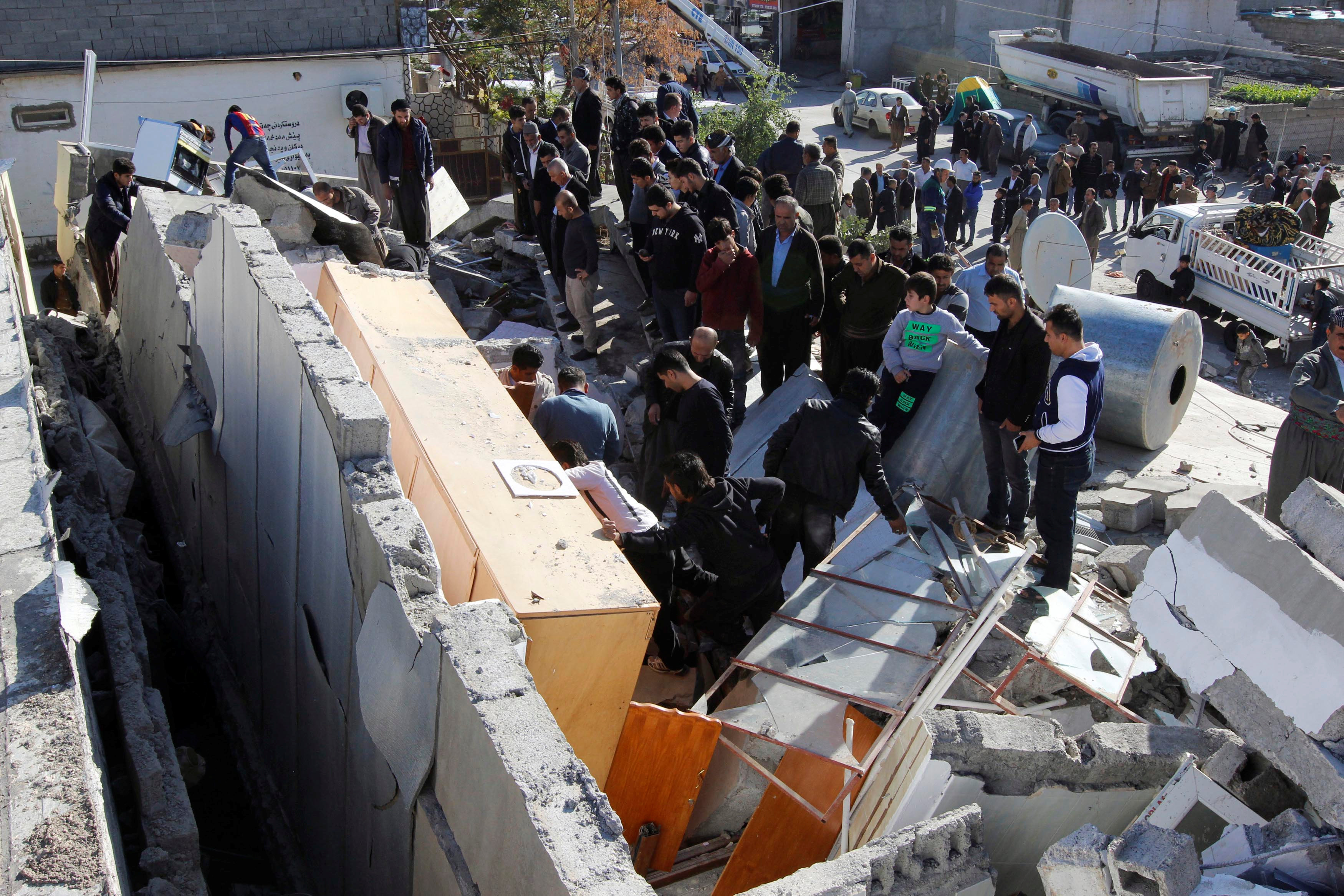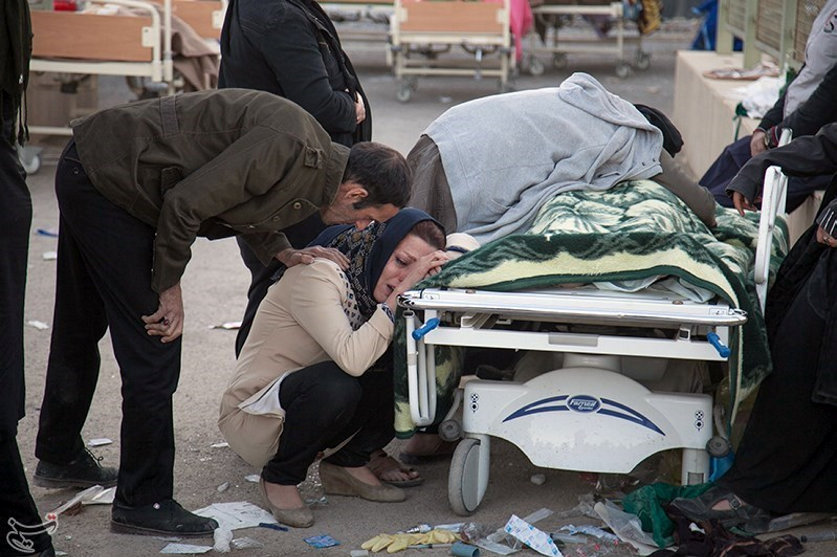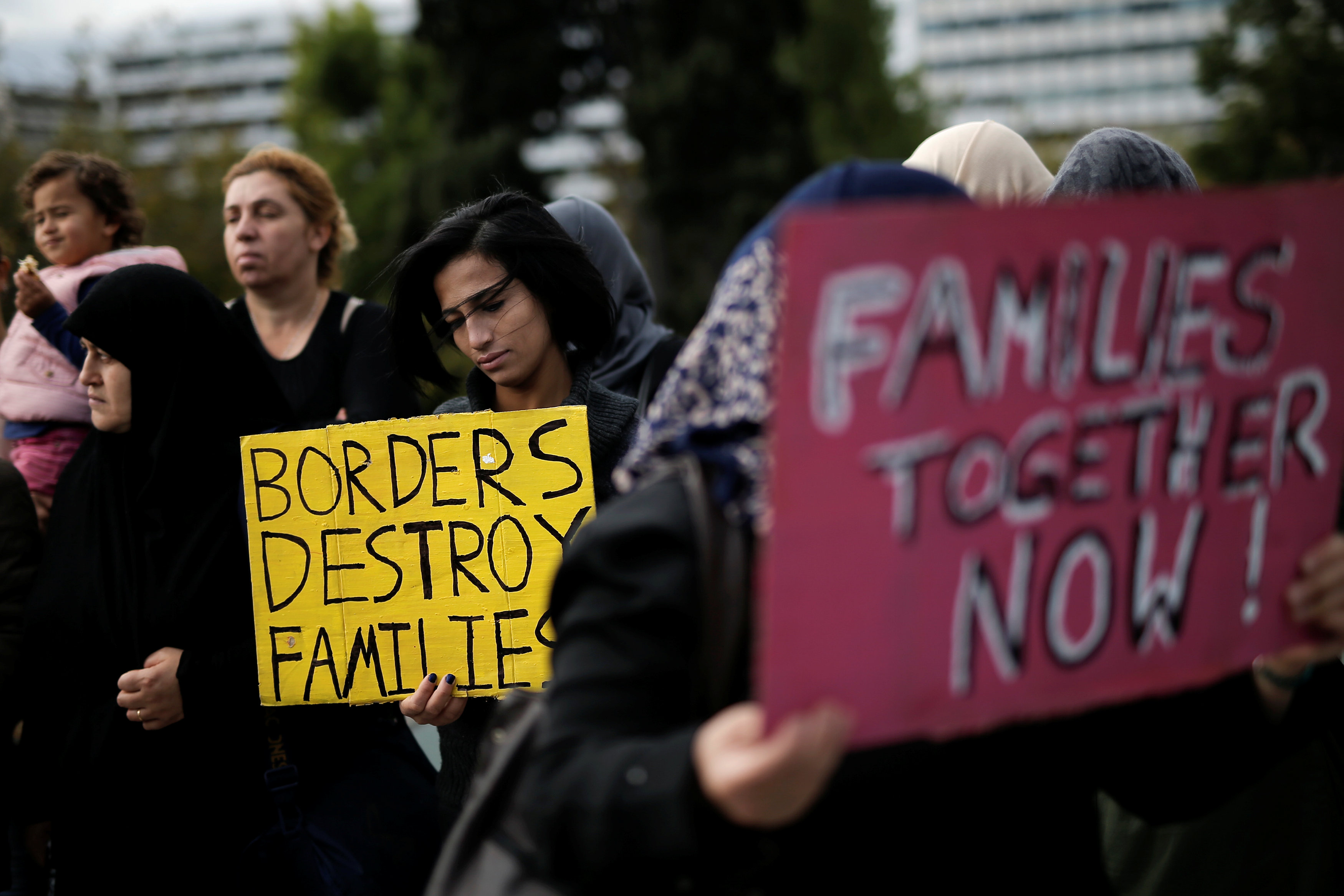
By Parisa Hafezi and Raya Jalabi
ANKARA/BAGHDAD (Reuters) – More than 300 people were killed in Iran when a magnitude 7.3 earthquake jolted the country on Sunday, state media said, and rescuers were searching for dozens trapped under rubble in the mountainous area. At least six have died in Iraq as well.
State television said more than 348 people were killed in Iran and at least 6,600 were injured. Local officials said the death toll would rise as search and rescue teams reached remote areas of Iran.
The earthquake was felt in several western provinces of Iran, but the hardest hit province was Kermanshah, which announced three days of mourning. More than 300 of the victims were in Sarpol-e Zahab county in Kermanshah province, about 15 km (10 miles) from the Iraq border.
Iranian state television said the quake had caused heavy damage in some villages where houses were made of earthen bricks. Rescuers were laboring to find survivors trapped under collapsed buildings.
Iranian media reported that a woman and her baby were pulled out alive from the rubble on Monday in Sarpol-e Zahab, the worst hit area with a population of 85,000.
The quake also triggered landslides that hindered rescue efforts, officials told state television. At least 14 provinces in Iran had been affected, Iranian media reported.
Iranian Supreme Leader Ayatollah Ali Khamenei offered his condolences on Monday, urging all government agencies to do all they could to help those affected.

Collapsed building is seen in the town of Darbandikhan, east of the city of Sulaimaniyah, in the semi-autonomous Kurdistan region, Iraq, November 13, 2017. REUTERS/Ako Rasheed
ANGRY PEOPLE
The U.S. Geological Survey said the quake measured magnitude 7.3. An Iraqi meteorology official put its magnitude at 6.5, with the epicenter in Penjwin in Sulaimaniyah province in the Kurdistan region, close to the main border crossing with Iran.
Tempers frayed in the quake-hit area as the search went on for survivors amidst twisted rubble of collapsed buildings. State TV aired footage of disfigured buildings, vehicles under rubble and wounded people wrapped in blankets.
“We need a shelter … ” a middle-aged man in Sarpol-e Zahab told state TV. “Where is the aid? Where is the help?” His family could not spend another night outside in cold weather, he said.
Kurdish health officials said at least six people were killed in Iraq and at least 68 injured. Iraq’s health and local officials said the worst-hit area was Darbandikham district, near the border with Iran, where at least 10 houses had collapsed and the district’s only hospital was severely damaged.
“The situation there is very critical,” Kurdish Health Minister Rekawt Hama Rasheed told Reuters.
The district’s main hospital was severely damaged and had no power, Rasheed said, so the injured were taken to Sulaimaniyah for treatment. Homes and buildings had extensive structural damage, he said.
The quake was felt as far south as Baghdad, where many residents rushed from their houses and tall buildings when tremors shook the Iraqi capital.
“I was sitting with my kids having dinner and suddenly the building was just dancing in the air,” said Majida Ameer, who ran out of her building in the capital’s Salihiya district with her three children.
“I thought at first that it was a huge bomb. But then I heard everyone around me screaming: ‘Earthquake!'”
Similar scenes unfolded in Erbil, the capital of the Kurdistan Region, and across other cities in northern Iraq, close to the quake’s epicenter.
Iraq’s meteorology center advised people to stay away from buildings and not to use elevators in case of aftershocks.

A woman reacts next to a dead body following an earthquake in Sarpol-e Zahab county in Kermanshah, Iran November 13, 2017. Tasnim News Agency/Handout via REUTERS
NO SHELTER
Electricity and water was cut off in several Iranian and Iraqi cities, and fears of aftershocks sent thousands of people in both countries out onto the streets and parks in cold weather.
Across the area, thousands of rescue workers and special teams using sniffer dogs and heat sensors searched wreckage. Blocked roads made it hard for rescue workers to reach some remote villages.
Iranian authorities acknowledged the relief effort was still slow and patchy. The Iranian seismological center registered around 153 aftershocks and said more were expected. More than 70,000 people needed emergency shelter, the head of Iranian Red Crescent said.
Hojjat Gharibian was one of hundreds of homeless Iranian survivors, who was huddled against the cold with his family in Qasr-e Shirin.
“My two children were sleeping when the house started to collapse because of the quake. I took them and ran to the street. We spent hours in the street until aid workers moved us into a school building,” Gharibian told Reuters by telephone.
Iran’s police, the elite Revolutionary Guards and its affiliated Basij militia forces were dispatched to the quake-hit areas overnight, state TV reported. President Hassan Rouhani is expected to visit the Kermanshah province, TV reported.
Iran sits astride major fault lines and is prone to frequent tremors. A magnitude 6.6 quake on Dec. 26, 2003, devastated the historic city of Bam, 1,000 km southeast of Tehran, killing about 31,000 people.
An Iranian oil official said pipelines and refineries in the area remained intact.
TURKEY AND ISRAEL
Residents of Turkey’s southeastern city of Diyarbakir also reported feeling a strong tremor, but there were no immediate reports of damage or casualties there.
Turkish Red Crescent Chairman Kerem Kinik told broadcaster NTV that Red Crescent teams in Erbil were preparing to go to the site of the earthquake and that Turkey’s national disaster management agency, AFAD, and National Medical Rescue Teams were also preparing to head into Iraq.
AFAD’s chairman said the organization was waiting for a reply to its offer for help.
In a tweet, Kinik said the Turkish Red Crescent was gathering 3,000 tents and heaters, 10,000 beds and blankets and moving them toward the Iraqi border.
“We are coordinating with Iranian and Iraqi Red Crescent groups. We are also getting prepared to make deliveries from our northern Iraq Erbil depot,” he said.
Israeli media said the quake was felt in many parts of Israel as well. In a statement, Israeli Intelligence Minister Israel Katz said, “My condolences to the people of Iran and Iraq over the loss of human life caused by the earthquake.” Iran refuses to recognize Israel.
(Writing by Parisa Hafezi, reporting by Raya Jalabi and Ahmed Rasheed in Iraq, Bozorgmeh Sharafedin in Londn, Tuvan Gumrukcu and Irem Koca in Ankara, Dan Williams in Jerusalem, and Dubai newsroom; Editing by Peter Cooney, Bill Tarrant, Larry King)









